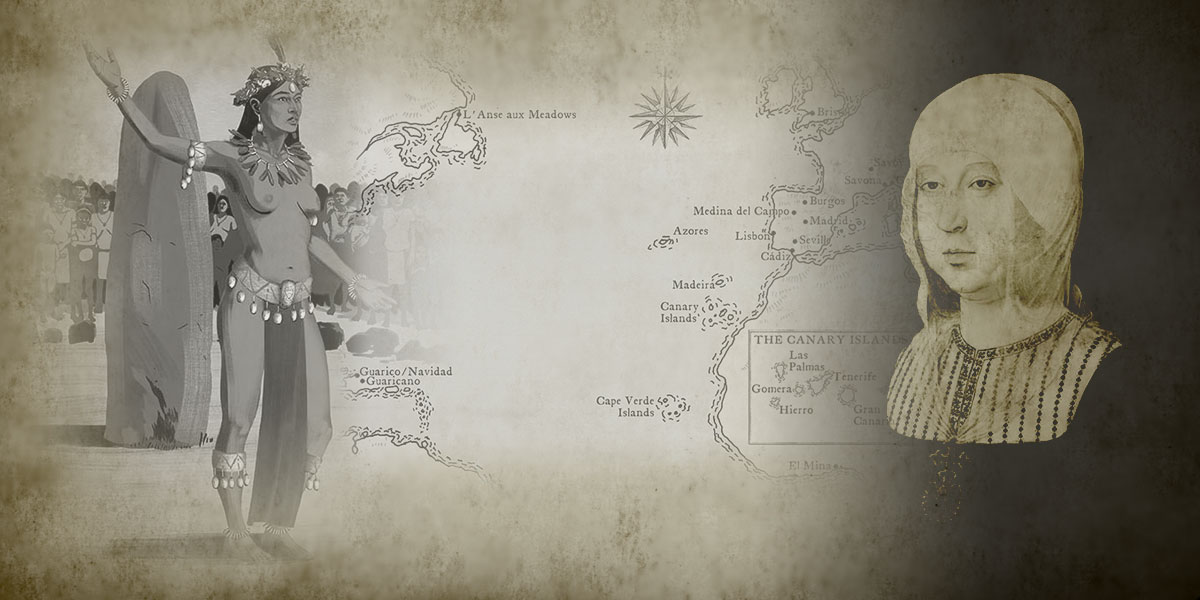
Andrew’s Current Blog
Archived blogs chronicling 1492 from a bicultural perspective appear under 1492 Blogs.
Andrew’s Current Blog
Archived blogs chronicling 1492 from a bicultural perspective appear under 1492 Blogs.
Hojeda’s Route
After crossing Puerto de los Hidalgos, Alonso de Hojeda’s expedition descended south into the great valley of the modern Dominican Republic that Columbus would name La Vega Real (the Royal Plain). Journeying for two weeks, the men forded the Yaque River (which retains...
Search for Gold
Columbus lost no time searching for the gold he’d promised Queen Isabella and King Ferdinand. On January 7, 1494, 528 years ago, he dispatched an expedition of over thirty lightly armed soldiers to find it in the island’s mountainous interior, led by the man who would...
First Mass at Isabela
As depicted in Columbus and Caonabó, a third of the voyagers—some four hundred men—were beset with fevers, headaches, vomiting, and diarrhea within days of debarking on the promontory. Modern epidemiologists speculate that the causes included dysentery from the...
Selection of Permanent Site
As depicted in Columbus and Caonabó, in December 1493 fierce easterly trade winds and harsh winter storms severely impeded Columbus’s journey east to select a permanent site to initiate the island’s conquest. When he finally anchored in the inlet at Río de Gracia,...
Search for Permanent Base for Conquest
Departing Chief Guacanagarí and the ruins of Navidad, in December 1493 Columbus’s fleet sailed back east along “Española’s” northern coast, searching for the optimal site to establish a permanent coastal base from which to launch the island’s invasion and conquest. He...
Navidad
On November 28, 1493, 528 years ago, a search party dispatched ashore reported to Columbus that Navidad had been burned to the ground. As recounted in Columbus and Caonabó, Columbus soon would confront Chief Guacanagarí, who would deny responsibility and blame Chief...
Arrival Offshore Navidad
As the moon rose on November 27, 1493, 528 years ago, Columbus recognized the landmarks indicating that the fleet approached Navidad, including the great cape to the west he’d named Punta Santa (Point Picolet, at Cape Haitien, Haiti), the line of reefs upon which the...
Monte Christi, northern coast of “Española”
Columbus’s fleet departed Samaná promptly after the sailor’s burial on November 23, 1493, sailing west for the settlement he’d named Navidad on the first voyage (near the modern town of Bord de Mer de Limonade, Haiti). He’d left a garrison of men there with Chief...
Samaná, northeastern “Española”
Columbus’s fleet sailed from Boriquén (Puerto Rico) to “Española” on November 22, 1493, and last rites were given the sailor most seriously wounded on St. Croix. The next day, 528 years ago, the ships anchored briefly off Española's mountainous Samaná peninsula...
St. Croix to Puerto Rico
On departing St. Croix, Columbus’s fleet coursed east over the next few days toward “Española.” While primary sources differ, my estimation is that Columbus now held almost thirty indigenous people seized or taken aboard at Guadeloupe and St. Croix. Some were Caribes,...
